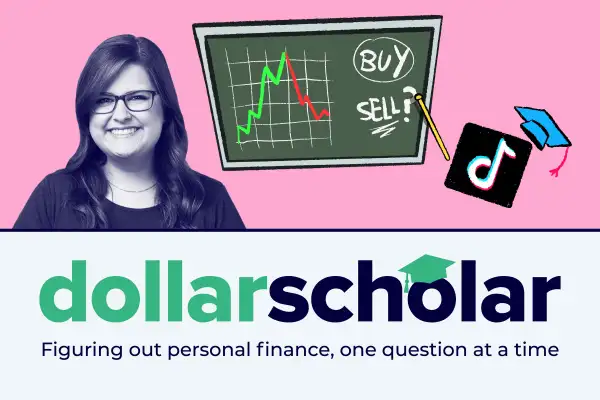Dollar Scholar Asks: Is There Any Smart Financial Advice on TikTok?

This is an excerpt from Dollar Scholar, the Money newsletter where news editor Julia Glum teaches you the modern money lessons you NEED to know. Don't miss the next issue! Sign up at money.com/subscribe and join our community of 160,000+ Scholars.
Last weekend, I was at a bar with my roommate when she flipped her phone around to show me an Instagram ad for a funny T-shirt. Within seconds, I was typing in my credit card number; a minute later, I had spent $40.
The shirt is hilarious — the design is a picture of Star Wars sadboi Anakin Skywalker above the Taylor Swift lyrics “I can fix him (no, really, I can)” — but it's scary how easily I was influenced. I didn’t even hesitate before pressing purchase.
Using social media these days means being influenced on pretty much everything all the time. And that includes money. There’s an entire community of “finfluencers” — financial influencers — who make content about investing, saving, spending and the like.
But anyone can say whatever they want online.
How should I vet financial tips I find on social media?
This is a real issue, especially for young people. In a WallStreetZen survey last year, 76% of Gen Zers said they learned about personal finance from YouTube and TikTok. Another 83% said they’ve encountered misleading money information online.
Jordan Sowhangar, vice president and wealth advisor at Girard, a Univest Wealth Division, tells me that while it’s great that these videos get younger consumers interested in money, it can be dangerous if they follow the directions blindly.
A 2023 paper from the Swiss Finance Institute analyzed the performance of over 29,000 finfluencers on Twitter and found that a whopping 56% of them had negative skills that led to worse investing returns. (“The advice by antiskilled finfluencers creates overly optimistic beliefs most times and persistent swings in followers’ beliefs,” the researchers wrote.)
So when I see financial content online, Sowhangar says, it’s important to look first for the creator’s credentials. On their page, do they list acronyms like CFP (certified financial planner), CPA (certified public accountant) or CFA (chartered financial analyst)? Do they have a Series 7 license (that allows them to sell securities) or a Series 66 license (for investment advisors)?
Each of these programs has its own requirements, but we’ll use the CFP certification process as an example. To become a CFP, a person has to complete an average of 12 to 18 months of financial planning coursework, have a bachelor’s degree, pass a 170-question exam, complete 6,000 hours of professional experience or 4,000 hours of apprenticeship work, sign an ethics declaration and pass a background check.
Whew.
Of course, it’s possible for someone who’s not credentialed to give good advice, but that’s not the point. The point is that by putting their training and experience on display, a creator is showing users “why they’re able and suitable to give this advice,” Sowhangar says. It also means that they report to a governing body and have to meet ongoing standards, so they can be held accountable if they don’t give good advice.
Still, just because someone says they’re a CFP doesn’t mean they necessarily are. Sowhangar says that I can and should search people’s names on BrokerCheck to verify that they actually have the chops they’re claiming to.
Transparency is a big issue with influencers, and that’s true in the financial space, as well. Creators who get paid to post ads and promote products are not always super upfront about what they’re doing. (Remember when Kim Kardashian had to pay $1.26 million in penalties after she illegally hawked a crypto security sold by EthereumMax?)
Sowhangar says to look at a person’s posts to see whether they’re disclosing sponsorships and ads. It also might not be a bad idea to Google their name to make sure they’ve not been caught secretly selling stuff on social media before.
On that note, any recommendation that a legit person is making should come with proof and caveats. Before Sowhangar can recommend a stock or mutual fund at her job, she has to pull fact sheets, research historical performance, compile data about returns and more. Any above-board finfluencer should too.
She says I should also be wary of anyone who’s pushing blanket advice. Educational content is one thing, but specific recommendations or steps you can take to definitely 100% get rich quick are a red flag. Personal finance is personal; no strategy works for every single person. It’s sketchy to claim otherwise.
Just think about how you’d recommend a moisturizer to a friend. Wouldn’t you pass it along with a warning? Wouldn’t you say something like “this worked for me, but it might give you acne, so be careful”? You should expect someone dishing out financial recs online to do the same.
The bottom line
To be clear, not all finfluencers are evil or trying to trick me into losing my hard-earned savings. But a lot of times, they aren’t educated enough to give proper advice, or they have competing interests that might not be immediately obvious to a casual observer scrolling through their For You Page.
Sowhangar says not to take anything at face value — to look for credentials, do my due diligence, demand proof, avoid blanket advice and be healthily skeptical.
If you find “somebody who is not afraid to be transparent about all of those things, then you're probably on the right track,” she adds.
More from Money:
Is It Rude to Ask People to Venmo Me for My Birthday?





